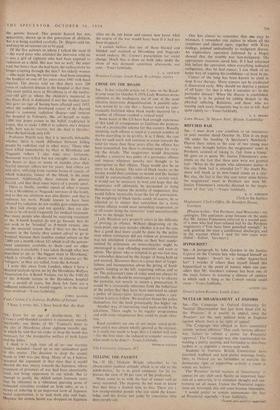Sig. –Even for an age of double-think. Mr. T. Crowe's
cold-blooded casuistry is excessively smooth. Inevitably, one thinks of Mr. Truman's letter to the city of Hiroshima about eightecu months ago, in which he said that his order to drop the bomb was necessary for 'the prospective welfare of both Japan and the Allies.'
I think it is high time all of us—our wartime leaders included—faced up to our undoubted guilt in this matter. The decision to drop the atomic bomb in 1945 was one thing. Many of us, I believe. accepted the argument at that time that it would shorten the war. mercy towards the Japanese, whose treatment of prisoners of war had been abominably cruel, not being uppermost in our minds. But to attempt to justify the Allied action fourteen years later by reference to a ridiculous guessing game of estimated casualties avoided on both sides, or as a means of ushering in an improved form of Japanese Social organisation, is to lack both pity and logic. (Because the atomic bomb was dropped on Japanese
cities we do not know and cannot now know what the course of the war would have been if it had not been dropped.) 1. cannot believe that any of those blasted and blinded and maimed at Hiroshima and Nagasaki would endorse Mr. Crowe's prescription for social change. Much that is done on both sides Under the stress of war demands contrition afterwards, not cant.—Yours faithfully, L. A. JACKSON Wootton Collage. South Road. Weylwidge. Surrey










































 Previous page
Previous page